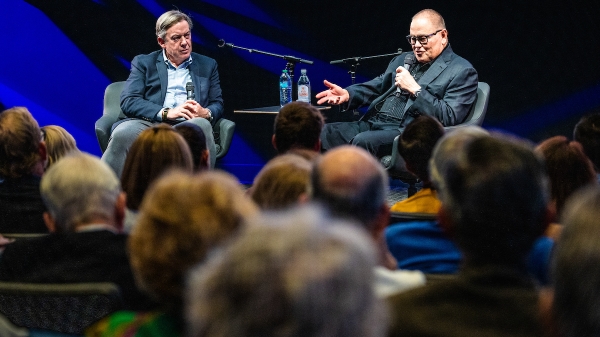W. P. Carey School to honor Northern Trust chief economist as most accurate forecaster

Northern Trust Chief Economist Carl Tannenbaum.
Despite continued uncertainty driven by the ongoing pandemic, labor shortages, supply chain disruptions and a series of geopolitical uncertainties, Northern Trust Chief Economist Carl Tannenbaum predicts the U.S. economy will continue its recovery from last year’s shocks.
Tannenbaum, the forecaster with the most accurate projections over the past four years, will deliver his economic outlook at a free, live online event from 6 to 7 p.m. (Eastern time) Oct. 11 with the W. P. Carey School of Business at Arizona State University. At that time, Tannenbaum will be honored with the Lawrence R. Klein Award for Blue Chip Forecast Accuracy, regarded as one of the best-known and longest-standing achievements in the field.
“I am delighted to win this award. I’ve been a Blue Chip forecaster across several institutions for more than 30 years, and it’s the first time I’ve been with the winning team. It is a great honor,” Tannenbaum said.
This is the second time Northern Trust has won the Lawrence R. Klein award as an organization. Amy Ostrom, interim dean of the W. P. Carey School of Business, will present Tannenbaum his award, which will be followed by his economic forecast for the coming year. Charles Evans, president of the Chicago Federal Reserve Bank, will introduce Tannenbaum.
There are 50 contributing forecasters for the Blue Chip competition from leading organizations across the country, including financial institutions, manufacturing firms, consulting companies and universities.
The award is judged and sponsored by the W. P. Carey School of Business. The Blue Chip Economic Indicators newsletter is the source of the forecasts used to select the winner.
“The award is based on the smallest average error for GDP (gross domestic product), CPI (consumer price index) and unemployment over the past four years,” said economics Professor Dennis Hoffman, director of the L. William Seidman Research Institute at ASU. “The predictions of Carl Tannenbaum and his Northern Trust team have held up remarkably, even through more recent developments such as inflation concerns, supply chain bottlenecks and the persistence of the COVID-19 pandemic.”
In addition to his economic duties, Tannenbaum is also responsible for the analytics and modeling group within Northern Trust’s risk management division, and he monitors the strategic risks facing the organization. He also publishes weekly commentaries and is frequently interviewed by media outlets such as The Wall Street Journal, Bloomberg and Reuters.
Before joining Northern Trust, Tannenbaum spent four years at the Federal Reserve, where he led the risk section. He was deeply involved in the central bank’s response to the 2008 financial crisis, helped to create and conduct its stress testing program, and advised senior Federal Reserve leaders on developments in banking and the financial markets. Tannenbaum began his career in banking at LaSalle Bank/ABN AMRO, a global banking organization with $1 trillion in total assets.
Tannenbaum is the current chairperson of the International Conference of Commercial Bank Economists and a past chairperson of the National Association for Business Economics, the Conference of Business Economists, the American Bankers Association’s Economic Advisory Committee and the North American Asset/Liability Management Association. He holds an MBA and a BA in finance and economics from the University of Chicago.
During the ceremony, Tannenbaum will deliver his 2022 predictions regarding:
- Which sectors of the U.S. economy will exhibit turbulence or growth.
- How a buildup of excess savings will impact consumer spending.
- How long current supply chain concerns will linger.
- How inflation will affect consumer behavior and business decisions in the year ahead.
- What COVID-19 spikes and declines mean for employment trends, policies, and the growth cycle.
For more information or to register for the Lawrence R. Klein Award event Oct. 11, visit wpcarey.asu.edu/alumni/klein-award. Journalists who attend as members of the virtual audience can ask questions during the Q&A section of the event.
Established in 1976, Wolters Kluwer's Blue Chip Economic Indicators is synonymous with the latest in expert opinion on the future performance of the U.S. economy. Each month Haver Analytics compiles the forecasts of 50 leading business economists for key indicators of economic growth.
More Business and entrepreneurship

How individuals and businesses can rethink their resolutions this year
Making resolutions is common this time of year.Losing weight. Leading a healthier lifestyle. Breaking a bad habit or two. These…

Scrappy, adaptive, inventive: A fireside chat with GoDaddy’s Bob Parsons
GoDaddy founder, Vietnam War Marine veteran and New York Times bestselling author Bob Parsons joined Arizona State University…

Why consumers are flying high this holiday season
A few years ago, the airline industry was in serious trouble.The COVID-19 pandemic crippled travel, and U.S. airlines received $…